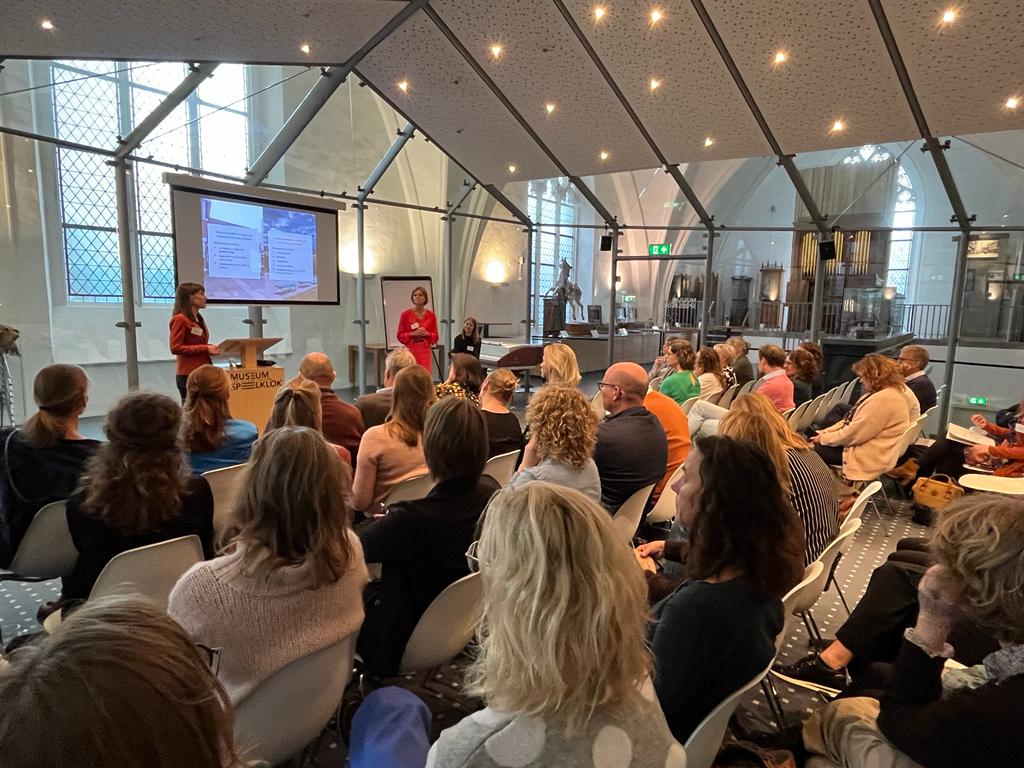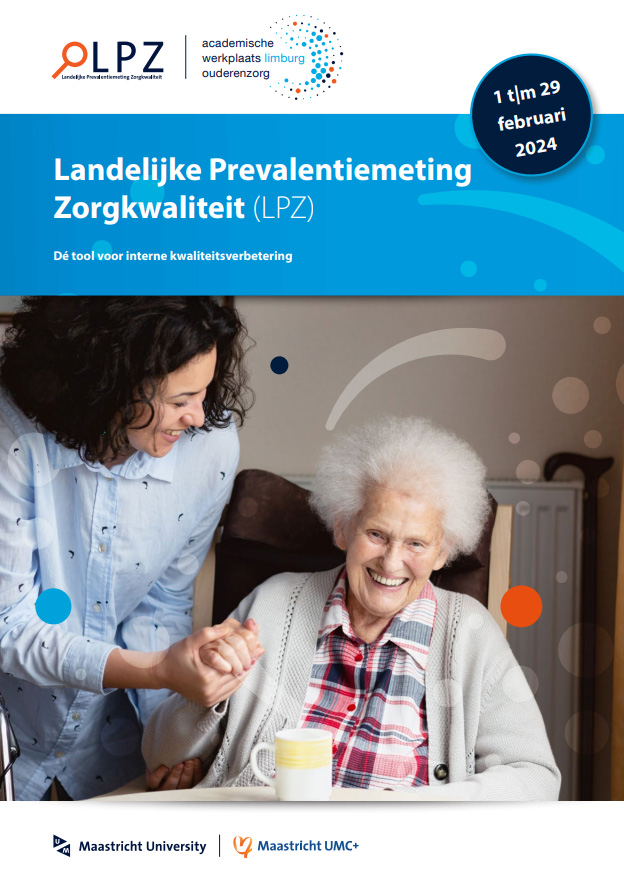The holidays are just around the corner, and 2023 is coming to an end, which means it is almost time to take a well-deserved break!
Reflecting on 2023, we take pride in the accomplishments that have marked another successful chapter, notably underscored by the recent site-visit of the External Review Committee. Their resounding conclusion echoes a clear sentiment “the heart was clear: enthusiastic, motivated, and committed CAPHRI researchers with a strong commitment to a better health for all!”
As we embrace the new year, let’s carry forward the flame of curiosity, collaboration, and compassion. Wishing each of you a season filled with warmth, joy, and inspiration.
Happy holidays, a prosperous New Year, and above all, a healthy 2024!
Silvia Evers and Sabina Bulić
|
|
|
|
|
|
|
In the recent newsletter, an error has been identified regarding: “Results of the study on "The Healthy Primary School of the Future". We apologize for any confusion; the correct information can be found below.
Evaluation of the Dutch Healthy School Program
There are large regional differences between schools that work according to the Healthy School program, both in the practical implementation and in the support that a school receives from the regional Public Health Services (GGD). As a result, the Healthy School program is less effective in the promotion of youth health than possible. This is evident from an evaluation study of the program by Maastricht University and a nationwide consortium, commissioned by ZonMw. Results were presented on November 2th during a meeting in Utrecht. In their final report, the researchers hope to significantly improve the regional support provided by the GGDs and the actual implementation of the approach in schools. According to the researchers, this depends on more structural financing of the Healthy School program from the government.

The complete research report with all results and recommendations and factsheet in Dutch
Read more
For more information contact Maria Jansen
|
|
|
|
|
|
Save the date: CAPHRI Research Day 2024
|
|
We extend a warm invitation to the 2024 edition of the CAPHRI Research Day on Wednesday, June 19, 2024. This annual event provides an opportunity for us to come together, share insights, and enhance our collective knowledge.
We encourage all CAPHRI researchers to join us for this annual event and to spread the word.
Registration will be open soon.
|
|
|
|
|
|
Socioeconomic Inequality and Type 2-Diabetes Mellitus
|
|
A 5-member team led by Professor Hans Bosma is working on a large-scale study on socioeconomic inequality and Type 2 Diabetes Mellitus (T2DM). In this, they are looking at underlying factors such as the living and working environment of people with a lower socioeconomic status (SES) and to what extent these hinder a healthier lifestyle (and thus lowering the risk of T2DM). The first results were published recently on the influence of SES on the development of T2DM and the mediating role the psychosocial work environment plays. The team used data from over 8000 participants in De Maastricht Studie for their research.
Read more
|
|
|
|
|
|
|
In honor of World AIDS Day, we spotlight Hanneke Goense with her role in ‘Limburg4zero', a collaboration targeting zero new HIV infections in Limburg. The collaboration, with an 8.5/10 satisfaction rate, employs unique at-home test kits and focuses on equitable healthcare access, particularly for men who have sex with men.
Watch the video in which the successes of 3 years of Limburg4zero is shared
More information
|
|
|
|
|
|
A glimpse into World Aids Day in the Netherlands
|
|
December 1st marked World AIDS Day. Reflecting on 18 years in the field, Sarah Stutterheim attended the National Sex, HIV, STI conference (SHS2023) and NCHIV. At the National conference, the Spiral Consortium was launched, and Stutterheim moderated a workshop that explored diverse perspectives on HIV cure. She also co-led a workshop showcasing the RESET intervention, which is an intervention that aims to reduce self-stigma and empower people with HIV. That intervention was collaboratively developed with people with HIV and care providers and employed Intervention Mapping. At NCHIV, Stutterheim co-chaired a session on overcoming health disparities.
|
|
|
|
|
|
Prof. Rik Crutzen appointed as member of The Health Council
|
|
Professor Rik Crutzen (Department of Health Promotion, PHPC) has been appointed as member of the The Health Council as of January 1, 2024. The Health Council of the Netherlands is an independent scientific advisory body whose legal task it is to advise the Dutch ministers and Parliament in the field of public health and health/healthcare research.
Rik was already part of the permanent Committee on Population Screening. The task of this committee is threefold: to identify developments in population screening, to advise on population screening and to assess permit applications for population screening in relation to the Population Screening Act. In 2024, he will also become part of a temporary committee, which are formed for a specific advisory report, in this case about hearing screening of underaged.
|
|
|
|
|
|
Any activity is better for your heart than sitting
|
|
Replacing sitting with as little as a few minutes of moderate exercise a day tangibly improves heart health, according to new research Published in the European Heart Journal.
Dr Annemarie Koster: “This study suggests that small changes to how you move can have a positive effect on heart health, but intensity of movement matters. The most beneficial change we observed was replacing sitting with moderate to vigorous activity, which could be a run, a brisk walk, or stair climbing – basically any activity that raises your heart rate and makes you breathe faster, even for a minute or two only”.
Read more
|
|
|
|
|
|
Navigating LongCovid Challenges with insights from the PRIME Cohort
|
|
Last week, the PRIME cohort published its third paper on LongCovid, drawing significant attention from science, care, and societal communities.
Demi Pagen et al. revealed the high prevalence of post-exertional malaise (PEM) and orthostatic intolerance (OI) in LongCovid patients, advocating for the use of PEM and OI screening tools in care settings.
PRIME lead Nicole Dukers-Muijrers (HISP & PHPC) emphasizes the team's goals to raise awareness on LongCovid and its multifaceted impact, and to catalyze action on this urgent public health issue.
The team employs a transdisciplinary approach, integrating researchers, practice professionals, and informed by patient-organizations, utilizing advanced data-science methods from epidemiology, (social &) network analyses, artificial intelligence and health technology assessment, and, also very important, science communication.
PRIME uniquely follows non-hospitalized individuals tested for COVID-19 (since June 2020) at the Public Health Service South Limburg.
For 2024 you may anticipate more insights as we continue to study symptoms, recovery, and impact on health, study, work, and care. Nicole underscores the importance of sustaining this vital cohort in the future.
Recent publication
For more information see website (in Dutch)
|
|
|
|
|
|
Christian Hoebe on his article in Dagblad De Limburger
|
|
Professor of Social Medicine, Infectious Disease Control Christian Hoebe recently published a two-page article in Dagblad De Limburger, where he addressed the current vaccination rate of COVID-19, especially among those aged 60 and above (>65%). He expressed concerns about the importance attached to vaccination and discussed strategies to regain public confidence. Hoebe also reflected on the COVID-19 period.
Contrary to the previous tumultuous vaccination campaigns, the vaccination of tens of thousands of elderly individuals and those with vulnerable health is currently taking place quietly at the Limburg GGDs (Public Health Services). Christian Hoebe (56), a professor of infectious disease control, a member of the Outbreak Management Team (OMT), and former chair of the COVID-19 advisory committee of the Health Council, found himself at the center of the storm during the pandemic. As the program leader of the Academic Workplace for Public Health Mosa (a collaboration between GGD South Limburg and CAPHRI University of Maastricht), he plays a crucial role in various COVID-19 studies conducted in Limburg. This includes research on how vaccine hesitancy can be addressed to emphasize the importance of getting vaccinated.
|
|
|
|
|
|
Episode 3 of the De Jonge Akademie Podcast with Hilde Verbeek is Now Live
|
|
In this episode, Hilde Verbeek discusses CAPHRI initiatives and the CAPHRI PhD Track system, highlighting our team dynamics at the HSR department as a positive example in doctoral guidance. Recorded last year, this insightful episode is available online. Tune in to discover more about our successful mentoring model here.
|
|
|
|
|
|
The National Prevalence Measurement of Quality of Care
|
|
The National Prevalence Measurement of Quality of Care (in Dutch: Landelijke Prevalentiemeting Zorgkwaliteit (LPZ)) is the annual data collection on the prevalence, - prevention and treatment of relevant basic care problems.
The LPZ started in 1998 as a data collection on the prevalence of pressure injuries, and has grown into a fully-fledged data collection on care problems in general, such as incontinence, malnutrition, falls, involuntary care, and pain, as well as data collection on performance indicators desired by the public health authorities and related to national frameworks of quality of care.
Participating healthcare organisations receive insight into the prevalence, prevention and treatment of the involved care problems and care indicators on organizational and ward level through an online dashboard, which also enables them to benchmark their results with national data. The annual insight into the extent of a care problem can stimulate organisations, care professionals and policymakers to take appropriate measures in order to improve their care services.
As of 2008, the LPZ has also become an international measurement instrument with multiple countries joining. In this way, health care organisations from different countries can also learn from each other.
In 2023 LPZ celebrated its 25th anniversary.

|
|
|
|
|
|
Enhance Your Health Economic Evaluation Skills in our March & April 2024 Course!
|
|
In March & April 2024 we are running our popular course ‘Health Technology Assessment (HTA and Health Economic Evaluation (EE)’ as part of the master’s programme in Epidemiology again. This crash course is open to PhD students, medical doctors, and graduates from medical or health sciences studies from universities or universities of applied sciences who wish to enhance their knowledge HTA/EE.
The objective of course is to learn about the theoretical foundation of HTA and more specifically EE. This course combines a deepening understanding of theoretical concepts with hands-on training in the basic elements of an economic evaluation with a strong link to practice.
Course dates: Fridays 15, 22, 28 March 2024. Handing in assignments on the 5th of April.
Location: Maastricht University
Participants will receive a certificate from Maastricht University after course completion.
Course coordinator: Dr. Ghislaine van Mastrigt
Faculty: Prof. Dr. Manuela Joore, Prof dr. Silvia Evers, Dr. Mickaël Hiligsmann, Dr. Sabina Grimm, Dr. Bram Ramaekers, Dr. Willem Witlox and Dr. Ghislaine van Mastrigt
For more information and to register, please email g.vanmastrigt@maastrichtuniversity.nl or visit our website for more details & and prices.
|
|
|
|
|
|
Boost your wellbeing for PhD candidates
|
|
Please note: This course has been moved from December 11th to February 29th
PhD candidates are a vulnerable group regarding (mental) health and wellbeing, but at the same time they are very talented. If you want to increase your resilience towards the demands of a PhD-trajectory, including developing skills to change these demands and increase your work-related and personal resources, then this training will be helpful for you.
When: February 29, 2024
What time: 8:30-12:30
Instructors: Drs. Marike Mulder , Prof. dr. Angelique de Rijk
More information
|
|
|
|
|
|
|
Simple Qualitative Administration For File Organization, Licensing, and Development
Get to know SQAFFOLD, a directory system with tools and resources
for qualitative and unified research projects, which aid project
management and making project materials public. Work with
preregistration templates, codebook development tools, inter-/intracoder agreement testing, and learn how to document your processes.
When: January 24, 2024
What time: 13:30-17:00 (CET)
Where: Peter Debyeplein (DEB) 1, first floor, room B1.099
Facilitator: Szilvia Zörgő

The Reproducible Open Coding Kit
The ROCK is a standard for the interoperable organization of research materials in a human- and machine-readable manner. The standard is implemented in the {rock} R package, which helps researchers organize data sources, designate attributes, code and segment narratives, as well as perform various analyses. Get to know the standard and work with the R package; no prior R skills necessary!
When: January 25, 2024
What time: 13:30-17:00 (CET)
Where: Peter Debyeplein (DEB) 1, first floor, room B1.099
Facilitator: Szilvia Zörgő

Participation is free, but bound to registration. You can find the registration link for both days here.
Is you have any questions, please contact Szilvia Zörgő.

|
|
|
|
|
|
|
|
|
Damon Willems | VHC
January 12, 2024 | 16:00 (CET)
Title: "Identification of unmet care needs, treatment preferences and health economic implications to optimize disease management outcomes in the field of chronic inflammatory skin diseases"
Hanan Alburno | PHPC
January 18, 2024 | 13:00 (CET)
Title: "eHealth intervention to optimize adherence in late adolescents and young adults with type 1 diabetes: content development and preparing adoption"
Rok Hrzic | VHC
January 23, 2024 | 16:00 (CET)
Title: "The role of European Union enlargement in mortality convergence across Europe"
Rebecca Farah | VHC
January 30, 2024 | 16:00 (CET)
Title: "Cardiovascular & Pulmonary Rehabilitation in Lebanon"
Mitch van Hinsbergen | HISP
January 31, 2024 | 16:00 (CET)
Title: "Improving infectious disease control in care facilities Studies on infection prevention, antimicrobial resistance and COVID-19"
|
|
|
|
|
|
Your project, event or idea in this newsletter?
|
|
|
|
|
|
|